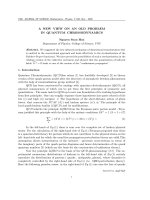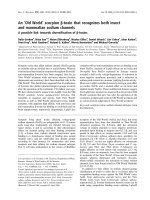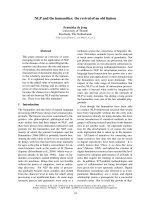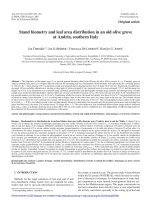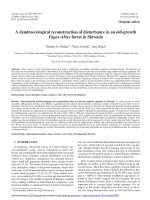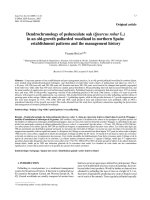An old mans love
Bạn đang xem bản rút gọn của tài liệu. Xem và tải ngay bản đầy đủ của tài liệu tại đây (803.67 KB, 201 trang )
TheProjectGutenbergeBook,AnOldMan'sLove,byAnthonyTrollope
ThiseBookisfortheuseofanyoneanywhereatnocostandwith
almostnorestrictionswhatsoever.Youmaycopyit,giveitawayor
re-useitunderthetermsoftheProjectGutenbergLicenseincluded
withthiseBookoronlineatwww.gutenberg.org
Title:AnOldMan'sLove
Author:AnthonyTrollope
ReleaseDate:April8,2008[eBook#25001]
HTMLversionmostrecentlyupdated:July21,2010
Language:English
Charactersetencoding:ISO-8859-1
***START OF THE PROJECT GUTENBERG EBOOK AN OLD MAN'S
LOVE***
E-textpreparedbyDelphineLettau,JosephE.Loewenstein,M.D.,
andtheProjectGutenbergOnlineDistributedProofreadingTeam
()
ANOLDMAN'SLOVE
by
ANTHONYTROLLOPE
InTwoVolumes
WilliamBlackwoodandSons
EdinburghandLondon
MDCCCLXXXIV
NOTE.
Thisstory,"AnOldMan'sLove,"isthelastof
my father's novels. As I have stated in the
preface to his Autobiography, "The
Landleaguers" was written after this book, but
wasneverfullycompleted.
HENRYM.TROLLOPE.
CONTENTS
VOLUMEI.
I. MRSBAGGETT
II. MRWHITTLESTAFF
III. MARYLAWRIE
IV. MARYLAWRIEACCEPTSMRWHITTLESTAFF
V. "ISUPPOSEITWASADREAM"
VI. JOHNGORDON
VII. JOHNGORDONANDMRWHITTLESTAFF
VIII. JOHNGORDONANDMARYLAWRIE
IX. THEREVMONTAGUBLAKE
X. JOHNGORDONAGAINGOESTOCROKER'SHALL
XI. MRSBAGGETTTRUSTSONLYINTHEFUNDS
MRBLAKE'SGOODNEWS
XII.
VOLUMEII.
XIII. ATLITTLEALRESFORD
XIV. MRWHITTLESTAFFISGOINGOUTTODINNER
XV. MRWHITTLESTAFFGOESOUTTODINNER
XVI. MRSBAGGETT'SPHILOSOPHY
XVII. MRWHITTLESTAFFMEDITATESAJOURNEY
XVIII. MRANDMRSTOOKEY
XIX. MRWHITTLESTAFF'SJOURNEYDISCUSSED
XX. MRWHITTLESTAFFTAKESHISJOURNEY
XXI. THEGREENPARK
XXII. JOHNGORDONWRITESALETTER
XXIII. AGAINATCROKER'SHALL
XXIV. CONCLUSION
VOLUMEI.
CHAPTERI.
MRSBAGGETT.
MrWilliamWhittlestaffwasstrollingveryslowlyupanddownthelongwalk
at his country seat in Hampshire, thinking of the contents of a letter which he
held crushed up within his trousers' pocket. He always breakfasted exactly at
nine,andthelettersweresupposedtobebroughttohimataquarterpast.The
postmanwasreallydueathishall-doorataquarterbeforenine;butthoughhe
had lived inthesamehouseforabovefifteen years,and thoughhewasa man
veryanxioustogethisletters,hehadneveryetlearnedthetruthaboutthem.He
wassatisfiedinhisignorancewith9.15 A.M.,butonthisoccasionthepost-boy,
as usual, was ten minutes after that time. Mr Whittlestaff had got through his
secondcupoftea,andwasstrandedinhischair,havingnothingtodo,withthe
empty cup and plates before him for the space of two minutes; and,
consequently,whenhehadsentsometerriblemessageouttothepost-boy,and
then had read the one epistle which had arrived on this morning, he thus
liberatedhismind:"I'llbewhippedifIwillhaveanythingtodowithher."But
thismustnotbetakenasindicatingtheactualstateofhismind;butsimplythe
condition of anger to which he had been reduced by the post-boy. If any one
weretoexplaintohimafterwardsthathehadsoexpressedhimselfonasubject
ofsuchimportance,hewouldhavedeclaredofhimselfthathecertainlydeserved
tobewhippedhimself.Inorderthathemightintruthmakeuphismindonthe
subject,hewentoutwithhishatandstickintothelongwalk,andtherethought
out the matter to its conclusion. The letter which he held in his pocket ran as
follows:—
ST.TAWELL'S,NORWICH,February18—.
MYDEARMRWHITTLESTAFF,—PoorMrsLawriehasgoneatlast.
Shediedthismorningatseveno'clock,andpoorMaryisaltogetheralonein
theworld.Ihaveaskedhertocomeinamongusforafewdaysatanyrate,
tillthefuneralshallbeover.Butshehasrefused,knowing,Isuppose,how
crowdedandhowsmallourhouseis.Whatisshetodo?Youknowallthe
circumstancesmuchbetterthanIdo.Shesaysherselfthatshehadalways
beenintendedforagoverness,andthatshewill,ofcourse,followoutthe
intention which had been fixed on between her and her father before his
death.Butitisamostwearyprospect,especiallyforonewhohasreceived
no direct education for the purpose. She has devoted herself for the last
twelvemonthstoMrsLawrie,asthoughshehadbeenhermother.Youdid
not like Mrs Lawrie, nor did I; nor, indeed, did poor Mary love her very
dearly.Butshe,atanyrate,didherdutybyherstep-mother.Iknowthatin
regardtoactualmoneyyouwillbegenerousenough;butdoturnthematter
overinyourmind,andendeavourtothinkofsomefutureforthepoorgirl.
—Yoursveryfaithfully,
EMMAKING.
Itwasinanswertosuchaletterasthis,thatMrWhittlestaffhaddeclaredthat
"He'd be whipped if he'd have anything to do with her." But that expression,
whichmustnotintruthbeacceptedasmeaninganything,mustnotbesupposed
to have had even that dim shadow of a meaning which the words may be
supposed to bear. He had during the last three months been asking himself the
questionastowhatshouldbeMaryLawrie'sfateinlifewhenherstep-mother
shouldhavegone,andhadneverquitesolvedthequestionwhetherhecouldor
wouldnotbringintohisownhouse,almostasadaughter,ayoungwomanwho
wasinnowayrelatedtohim.Hehadalwaysbeguntheseexercisesofthought,
bytellinghimselfthattheworldwasacensoriousoldfool,andthathemightdo
justashepleasedastomakinganygirlhisdaughter.Butthen,beforedinnerhe
hadgenerallycometotheconclusionthatMrsBaggettwouldnotapprove.Mrs
Baggettwashishousekeeper,andwastohimcertainlyapersonofimportance.
He had not even suggested the idea to Mrs Baggett, and was sure that Mrs
Baggettwouldnotapprove.AstosendingMaryLawrieoutintotheworldasa
governess;—thatplanhewasquitesurewouldnotanswer.
Twoyearsagohaddiedhisbestbelovedfriend,CaptainPatrickLawrie.With
himwehavenotanythingtodo,excepttosaythatofallmenhewasthemost
impecunious. Late in life he had married a second wife,—a woman who was
hard, sharp, and possessed of an annuity. The future condition of his only
daughter had been a terrible grief to him; but from Mr Whittlestaff he had
received assurances which had somewhat comforted him. "She shan't want. I
can'tsayanythingfurther."SuchhadbeenthecomfortgivenbyMrWhittlestaff.
And since his friend's death Mr Whittlestaff had been liberal with presents,—
whichMaryhadtakenmostunwillinglyunderherstep-mother'sguidance.Such
hadbeenthestateofthingswhenMrWhittlestaffreceivedtheletter.Whenhe
hadbeenwalkingupanddownthelongwalkforanextrahour,MrWhittlestaff
expressedaloudtheconclusiontowhichhehadcome."Idon'tcareonestrawfor
Mrs Baggett." It should be understood as having been uttered in direct
oppositiontothefirstassurancemadebyhim,that"He'dbewhippedifhe'dhave
anythingtodowithher."InthathourhehadresolvedthatMaryLawrieshould
cometohim,andbemade,withallpossiblehonoursofownership,withallits
privilegesandallitsresponsibilities,themistressofhishouse.Andhemadeup
hismindalsothatsuchhadeverbeenhisdetermination.HewasfiftyandMary
Lawrie was twenty-five. "I can do just what I please with her," he said to
himself, "as though she were my own girl." By this he meant to imply that he
wouldnot beexpected tofallinlovewithher,andthatitwas quiteoutofthe
questionthatsheshouldfallinlovewithhim."GoandtellMrsBaggettthatI'll
bemuchobligedtoherifshe'llputonherbonnetandcomeouttomehere."This
hesaidtoagardener'sboy,andtheorderwasnotatallanunusualone.Whenhe
wanted to learn what Mrs Baggett intended to give him for dinner, he would
sendfortheoldhousekeeperandtakeawalkwithherfortwentyminutes.Habit
had made Mrs Baggett quite accustomed to the proceeding, which upon the
wholesheenjoyed.Shenowappearedwithabonnet,andawaddedcloakwhich
hermasterhadgivenher."It'saboutthatletter,sir,"saidMrsBaggett.
"Howdoyouknow?"
"Didn't I see the handwriting, and the black edges? Mrs Lawrie ain't no
more."
"MrsLawriehasgonetoherlongaccount."
"I'm afeared, sir, she won't find it easy to settle the bill," said Mrs Baggett,
whohadasharp,cynicalwayofexpressingherdisapprobation.
"MrsBaggett,judgenot,lestyoubejudged."MrsBaggettturneduphernose
andsnuffedtheair."Thewomanhasgone,andnothingshallbesaidagainsther
here.Thegirlremains.Now,I'lltellyouwhatImeantodo."
"Sheisn'ttocomehere,MrWhittlestaff?"
"Heresheistocome,andheresheistoremain,andheresheistohaveher
partofeverythingasthoughsheweremyowndaughter.And,asnotthesmallest
portionofthegoodthingsthatistocometoher,sheistohavehershareinyour
heart,MrsBaggett."
"I don't know nothing about my heart, Mr Whittlestaff. Them as finds their
waytomyhearthastoworktheirwaythere.Who'sMissLawrie,thatI'mtobe
knockedaboutforanewcomer?"
"SheisjustMaryLawrie."
"I'mthatoldthatIdon'tfeellikehavingayoungmissusputoverme.Andit
ain'tforyourgood,MrWhittlestaff.Youain'tayoungman—noryouain'tanold
un;andsheain'tnorelationstoyou.That'stheworstpartofit.Assureasmy
nameisDorothyBaggett,you'llbefallinginlovewithher."ThenMrsBaggett,
withthesenseoftheaudacityofwhatshehadsaid,lookedhimfullintheface
andviolentlyshookherhead.
"Nowgoin,"hesaid,"andpackmythingsupforthreenights.I'mgoingto
Norwich, and I shan't want any dinner. Tell John I shall want the cart, and he
mustbereadytogowithmetothestationat2.15."
"Ioughttobereadytocutthetongueoutofmyhead,"saidMrsBaggettas
shereturnedtothehouse,"forImighthaveknownitwasthewaytomakehim
startatonce."
Not in three days, but before the end of the week, Mr Whittlestaff returned
home,bringingwithhimadark-featuredtallgirl,clothed,ofcourse,indeepest
mourning from head to foot. To Mrs Baggett she was an object of intense
interest; because, although she had by no means assented to her master's
proposal,madeonbehalfoftheyounglady,anddidtellherselfagainandagain
duringMrWhittlestaff'sabsencethatshewasquitesurethatMaryLawriewasa
baggage,yetinherheartsheknewittobeimpossiblethatshecouldgoonliving
inthehousewithoutlovingonewhomhermasterloved.Withregardtomostof
those concerned in the household, she had her own way. Unless she would
favourthegroom,andthegardener,andtheboy,andthegirlswhoservedbelow
her,MrWhittlestaffwouldhardlybecontentedwiththosesubordinates.Hewas
theeasiestmasterunderwhomaservantcouldlive.Buthisfavourhadtobewon
throughMrsBaggett'ssmiles.Duringthelasttwoyears,however,therehadbeen
enoughofdiscussionaboutMaryLawrietoconvinceMrsBaggettthat,inregard
tothis"interloper,"asMrsBaggetthadoncecalledher,MrWhittlestaffintended
to have his own way. Such being the case, Mrs Baggett was most anxious to
knowwhethertheyoungladywassuchasshecouldlove.
Strangely enough, when the young lady had come, Mrs Baggett, for twelve
months,couldnotquitemakeuphermind.Theyoungladywasverydifferent
from what she had expected. Of interference in the house there was almost
literally none. Mary had evidently heard much of Mrs Baggett's virtues,—and
infirmities,—andseemedtounderstandthatshealsohadinmanythingstoplace
herselfunderMrsBaggett'sorders."Lordloveyou,MissMary,"shewasheard
tosay;"asifwedidnotallunderstandthatyouwastobemissusofeverythingat
Croker's Hall,"—for such was the name of Mr Whittlestaff's house. But those
who heard it knew that the words were spoken in supreme good humour, and
judgedfromthat,thatMrsBaggett'shearthadbeenwon.ButMrsBaggettstill
had her fears; and was not yet resolved but that it might be her duty to turn
againstMaryLawriewithalltheviolenceinherpower.Forthefirstmonthor
twoaftertheyounglady'sarrival,shehadalmostmadeuphermindthatMary
LawriewouldneverconsenttobecomeMrsWhittlestaff.Anoldgentlemanwill
seldomfallinlovewithoutsomeencouragement;oratanyrate,willnottellhis
love. Mary Lawrie was as cold to him as though he had been seventy-five
insteadoffifty.Andshewasalsoasdutiful,—bywhichsheshowedMrsBaggett
morestronglyeventhanbyhercoldness,thatanyideaofmarriagewasonher
partoutofthequestion.
This, strange to say, Mrs Baggett resented. For though she certainly felt, as
would do any ordinary Mrs Baggett in her position, that a wife would be
altogether detrimental to her interest in life, yet she could not endure to think
that"alittlestuck-upminx,takeninfromcharity,"shouldruncountertoanyof
hermaster'swishes.OnoneortwooccasionsshehadspokentoMrWhittlestaff
respectingtheyoungladyandhadbeencruellysnubbed.Thiscertainlydidnot
creategoodhumouronherpart,andshebegantofancyherselfangryinthatthe
youngladywassoceremoniouswithhermaster.Butasmonthsranbyshefelt
that Mary was thawing, and that Mr Whittlestaff was becoming more
affectionate.Ofcoursetherewereperiodsinwhichhermindveeredround.But
attheendoftheyearMrsBaggettcertainlydidwishthattheyoungladyshould
marryheroldmaster."IcangodowntoPortsmouth,"shesaidtothebaker,who
was a most respectable old man, and was nearer to Mrs Baggett's confidence
thananyoneelseexcepthermaster,"andwearyoutthereston'emthere."When
shespokeof"wearyingoutthereston'em,"herfriendperfectlyunderstoodthat
shealludedtowhatyearsshemightstillhavetolive,andtotheabjectmiseryof
her latter days, which would be the consequence of her resigning her present
modeoflife.MrsBaggettwassupposedtohavebeenbornatPortsmouth,and,
therefore, to allude to that one place which she knew in the world over and
beyondtheresidencesinwhichhermasterandhermaster'sfamilyhadresided.
BeforeIgoontodescribethecharactersofMrWhittlestaffandMissLawrie,
ImustdevoteafewwordstotheearlylifeofMrsBaggett.DorothyTedcaster
hadbeenborninthehouseofAdmiralWhittlestaff,theofficerincommandat
the Portsmouth dockyard. There her father or her mother had family
connections, to visit whom Dorothy, when a young woman, had returned from
the then abode of her loving mistress, Mrs Whittlestaff. With Mrs Whittlestaff
shehadlivedabsolutelyfromthehourofherbirth,andofMrsWhittlestaffher
mind was so full, that she did conceive her to be superior, if not absolutely in
rank,atanyrateinallthegracesandfavoursoflife,toherMajestyandallthe
royal family. Dorothy in an evil hour went back to Portsmouth, and there
encountered that worst of military heroes, Sergeant Baggett. With many
lamentations,andconfessionsastoherownweakness,shewrotetohermistress,
acknowledging that she did intend to marry "B." Mrs Whittlestaff could do
nothingtopreventit,andDorothydidmarry"B."Ofthemiseryandill-usage,of
the dirt and poverty, which poor Dorothy Baggett endured during that year, it
needs not here to tell. That something had passed between her and her old
mistresswhenshereturnedtoher,must,Isuppose,havebeennecessary.Butof
hermarriedlife,insubsequentyears,MrsBaggettneverspokeatall.Eventhe
baker only knew dimly that there had been a Sergeant Baggett in existence.
Yearshadpassedsincethatbadquarterofanhourinherlife,beforeMrsBaggett
had been made over to her present master. And he, though he probably knew
somethingoftheabominableSergeant,neverfounditnecessarytomentionhis
name. For this Mrs Baggett was duly thankful, and would declare among all
persons, the baker included, that "for a gentleman to be a gentleman, no
gentlemanwassuchagentleman"ashermaster.
It was now five-and-twenty years since the Admiral had died, and fifteen
since his widow had followed him. During the latter period Mrs Baggett had
livedatCroker'sHallwithMrWhittlestaff,andwithinthatperiodsomethinghad
leaked out as to the Sergeant. How it had come to pass that Mr Whittlestaff's
establishment had been mounted with less of the paraphernalia of wealth than
thatofhisparents,shallbetoldinthenextchapter;butitwasthecasethatMrs
Baggett,inherveryheartofhearts,wasdeeplygrievedatwhatsheconsideredto
bethepovertyofhermaster."You'reastupidoldfool,MrsBaggett,"hermaster
would say, when in some private moments her regrets would be expressed.
"Haven'tyougotenoughtoeat,andabedtolieon,andanoldstockingfullof
moneysomewhere?Whatmoredoyouwant?"
"Astockingfullofmoney!"shewouldsay,wipinghereyes;"thereain'tno
suchthing.Andasforeating,ofcourse,IeatsasmuchasIwants.Ieatsmore
thanIwants,ifyoucometothat."
"Thenyou'reverygreedy."
"Buttothinkthatyoushouldn'thaveamaninablackcoattopouroutaglass
ofwineforyou,sir!"
"Ineverdrinkwine,MrsBaggett."
"Well,whisky.Isupposeafellowlikethatwouldn'tbeabovepouringouta
glass of whisky for a gentleman;—though there's no knowing now what those
fellows won't turn up their noses at. But it's a come-down in the world, Mr
Whittlestaff."
"IfyouthinkI'vecomedownintheworld,you'dbetterkeepittoyourself,
andnottellme.Idon'tthinkthatI'vecomedown."
"Youbearupagainstitfinelylikeaman,sir;butforapoorwomanlikeme,I
do feel it." Such was Mrs Baggett and the record of her life. But this little
conversationtookplacebeforethecomingofMaryLawrie.
CHAPTERII.
MRWHITTLESTAFF.
MrWhittlestaffhadnotbeenafortunateman,asfortuneisgenerallycounted
intheworld.Hehadnotsucceededinwhathehadattempted.Hehad,indeed,
felt but little his want of success in regard to money, but he had encountered
failureinoneortwoothermatterswhichhadtouchedhimnearly.Insomethings
hislifehadbeensuccessful;buttheseweremattersinwhichtheworlddoesnot
writedownaman'sgoodluckasbeinggenerallyconducivetohishappiness.He
hadneverhadaheadache,rarelyacold,andnotatouchofthegout.Onelittle
fingerhadbecomecrooked,andhewasrecommendedtodrinkwhisky,whichhe
did willingly,—because it was cheap. He was now fifty, and as fit, bodily and
mentally, for hard work as ever he had been. And he had a thousand a-year to
spend,andspentitwithouteverfeelingthenecessityofsavingashilling.And
thenhehatednoone,andthosewhocameincontactwithhimalwayslikedhim.
Hetrodonnobody'scorns,andwas,generallyspeaking,themostpopularmanin
theparish.Thesetraitsarenotgenerallyreckonedasmarksofgoodfortune;but
they do tend to increase the amount of happiness which a man enjoys in this
world.Totellofhismisfortunesasomewhatlongerchronicleofhislifewould
be necessary. But the circumstances need only be indicated here. He had been
opposedineverythingtohisfather'sviews.Hisfather,findinghimtobeaclever
lad, had at first designed him for the Bar. But he, before he had left Oxford,
utterlyrepudiatedalllegalpursuits."Whatthedevildoyouwishtobe?"saidhis
father,whoatthattimewassupposedtobeabletoleavehisson£2000a-year.
The son replied that he would work for a fellowship, and devote himself to
literature.Theoldadmiralsentliteraturetoalltheinfernalgods,andtoldhisson
that he was a fool. But the lad did not succeed in getting his fellowship, and
neitherfathernormothereverknewtheamountofsufferingwhichheendured
thereby. He became plaintive and wrote poetry, and spent his pocket-money in
publishingit,whichagaincausedhimsorrow,notforthelossofhismoney,but
by the obscurity of his poetry. He had to confess to himself that God had not
conferred upon him the gift of writing poetry; and having acknowledged so
much,heneveragainputtwolinestogether.Ofallthishesaidnothing;butthe
sense of failure made him sad at heart. And his father, when he was in those
straits, only laughed at him, not at all believing the assurances of his son's
misery,whichfromtimetotimeweregiventohimbyhiswife.
Thentheoldadmiraldeclaredthat,ashissonwoulddonothingforhimself,
hemustworkforhisson.Andhetookinhisoldagetogoingintothecityand
speculatinginshares.ThentheAdmiraldied.Thesharescametonothing,and
calls were made; and when Mrs Whittlestaff followed her husband, her son,
looking about him, bought Croker's Hall, reduced his establishment, and put
downtheman-servantwhosedepartedglorywastoMrsBaggettamatterofsuch
deepregret.
ButbeforethistimeMrWhittlestaffhadencounteredthegreatestsorrowof
hislife.Eventhelostfellowship,eventherejectedpoetry,hadnotcausedhim
such misery as this. He had loved a young lady, and had been accepted;—and
thentheyoungladyhadjiltedhim.Atthistimeofhislifehewasaboutthirty;
andastotheoutsideworld,hewasabsolutelydumfoundedbythecatastrophe.
Uptothisperiodhehadbeenasportsmaninamoderatedegree,fishingagood
deal,shootingalittle,anddevotedtohunting,totheextentofasinglehorse.But
when the blow came, he never fished or shot, or hunted again. I think that the
young lady would hardly have treated him so badly had she known what the
effectwouldbe.HernamewasCatherineBailey,andshemarriedoneCompas,
who,asyearswenton,madeaconsiderablereputationasanOldBaileybarrister.
HisfriendsfearedatthetimethatMrWhittlestaffwoulddosomeinjuryeitherto
himself or Mr Compas. But no one dared to speak to him on the subject. His
mother,indeed,diddare,—orhalfdared.Buthesoansweredhismotherthathe
stoppedherbeforethespeechwasoutofhermouth."Don'tsayaword,mother;I
cannot bear it." And he stalked out of the house, and was not seen for many
hours.
There had then, in the bitter agony of his spirit, come upon him an idea of
blood.Hehimselfmustgo,—ortheman.Thenherememberedthatshewasthe
man'swife,andthatitbehovedhimtosparethemanforhersake.Then,whenhe
cametothinkinearnestofself-destruction,hetoldhimselfthatitwasacoward's
refuge. He took to his classics for consolation, and read the philosophy of
Cicero,andthehistoryofLivy,andthewarchroniclesofCæsar.Theydidhim
good,—in the same way that the making of many shoes would have done him
goodhadhebeenashoemaker.Incatchingfishesandridingafterfoxeshecould
notgivehismindtotheoccupation,soastoabstracthisthoughts.ButCicero's
de Natura Deorum was more effectual. Gradually he returned to a gentle
cheerfulness of life, but he never burst out again into the violent exercise of
shootingapheasant.Afterthathismotherdied,andagainhewascalleduponto
endurealastingsorrow.Butonthisoccasionthesorrowwasofthatkindwhich
issoftenedbyhavingbeenexpected.Herarelyspokeofhismother,—hadnever,
uptothisperiodatwhichourtalefindshim,mentionedhismother'snametoany
ofthoseabouthim.MrsBaggettwouldspeakofher,sayingmuchinthepraise
of her old mistress. Mr Whittlestaff would smile and seem pleased, and so the
subjectwouldpassaway.Therewassomethingtooreverendtohiminhisideaof
hismother,toadmitofhisdiscussinghercharacterwiththeservant.Buthewas
well pleased to hear her thus described. Of the other woman, of Catherine
Bailey,ofherwhohadfalselygivenherselfuptosopooracreatureasCompas,
after having received the poetry of his vows, he could endure no mention
whatever; and though Mrs Baggett knew probably well the whole story, no
attemptatnamingthenamewasevermade.
Such had been the successes and the failures of Mr Whittlestaff's life when
MaryLawriewasaddedasonetohishousehold.Thesameideahadoccurredto
himastoMrsBaggett.Hewasnotayoungman,becausehewasfifty;buthe
wasnotquiteanoldman,becausehewasonlyfifty.HehadseenMaryLawrie
oftenenough,andhadbecomesufficientlywellacquaintedwithhertofeelsure
thatifhecouldwinhershewouldbealovingcompanionfortheremainderof
hislife.Hehadturneditalloverinhismind,andhadbeennoweageraboutit
andnowbashful.Onmorethanoneoccasionhehaddeclaredtohimselfthathe
wouldbewhippedifhewouldhaveanythingtodowithher.Shouldhesubject
himselfagaintosomesuchagonyofdespairashehadsufferedinthematterof
CatherineBailey?Itmightnotbeanagonysuchasthat;buttohimtoaskandto
bedeniedwouldbeaterriblepain.Andasthegirldidreceivefromhishandsall
that she had—her bread and meat, her bed, her very clothes—would it not be
betterforherthatheshouldstandtoherintheplaceofafatherthanalover?She
might come to accept it all and not think much of it, if he would take before
himselftheguiseofanoldman.Butwerehetoappearbeforeherasasuitorfor
herhand,wouldsherefusehim?Lookingforward,hecouldperceivethatthere
wasroomforinfinitegriefifheshouldmaketheattemptandthenthingsshould
notgowellwithhim.
Butthemorehesawofherhewassurealsothattherewasroomforinfinite
joy.HecomparedherinhismindtoCatherineBailey,andcouldnotbutfeelthat
inhisyouthhehadbeenblindandfatuous.Catherinehadbeenafair-hairedgirl,
andhadnowblossomedoutintotheanxiousmotheroftenfair-hairedchildren.
Theanxietyhadnodoubtcomefromtheevilcoursesofherhusband.Hadshe
been contented to be Mrs Whittlestaff, there might have been no such look of
care, and there might perhaps have been less than ten children; but she would
still have been fair-haired, blowsy, and fat. Mr Whittlestaff had with infinite
troublefoundanopportunityofseeingherandherflock,unseenbythem,anda
portion of his agony had subsided. But still there was the fact that she had
promised to be his, and had become a thing sacred in his sight, and had then
givenherselfuptothearmsofMrCompas.ButnowifMaryLawriewouldbut
accepthim,howblessedmightbetheeveningofhislife!
Hehadconfessedtohimselfoftenenoughhowsadanddrearyhewasinhis
desolatelife.Hehadtoldhimselfthatitmustbesofortheremainderofalltime
tohim,whenCatherineBaileyhaddeclaredherpurposetohimofmarryingthe
successfulyounglawyer.Hehadatoncemadeuphismindthathisdoomwas
fixed,andhadnotregardedhissolitudeasanydeepaggravationofhissorrow.
But he had come by degrees to find that a man should not give up his life
becauseofaficklegirl,andespeciallywhenhefoundhertobethemotheroften
flaxenhairedinfants.Hehad,too,ashedeclaredtohimself,waitedlongenough.
ButMaryLawriewasverydifferentfromCatherineBailey.TheCatherinehe
hadknownhadbeenbright,andplump,andjoyous,withaquickgood-natured
wit, and a rippling laughter, which by its silvery sound had robbed him of his
heart.Therewasnoplumpness,andnosilver-soundinglaughterwithMary.She
shall be described in the next chapter. Let it suffice to say here that she was
somewhatstaidinherdemeanour,andnotatallgiventoputtingherselfforward
inconversation.Buteveryhourthathepassedinhercompanyhebecamemore
andmoresurethat,ifanywifecouldnowmakehimhappy,thiswasthewoman
whocoulddoso.
Butofhermannertohimselfhedoubtedmuch.Shewasgratitudeitselffor
whathewaspreparedtodoforher.Butwithhergratitudewasmingledrespect,
andalmostveneration.Shetreatedhimatfirstalmostasaservant,—atanyrate
withnoneofthefamiliarityofafriend,andhardlywiththereserveofagrownupchild.Gradually,inobediencetohisevidentwishes,shediddropherreserve,
andallowedherselftoconversewithhim;butitwasalwaysasayoungperson
might with all modesty converse with her superior. He struggled hard to
overcomeherreticence,anddidatlastsucceed.Butstilltherewasthatrespect,
vergingalmostintoveneration,whichseemedtocrushhimwhenhethoughtthat
hemightbegintoplaythelover.
He had got a pony carriage for her, which he insisted that she should drive
herself."ButIneverhavedriven,"shehadsaid,takingherplace,anddoubtfully
assumingthereins,whilehesatbesideher.Shehadatthistimebeensixmonths
atCroker'sHall.
"There must be a beginning for everything, and you shall begin to drive
now." Then he took great trouble with her, teaching her how to hold the reins,
and how to use the whip, till at last something of familiarity was engendered.
And he went out with her, day after day, showing her all those pretty haunts
amongthedownswhicharetobefoundintheneighbourhoodofAlresford.
Thisdidwellforatime,andMrWhittlestaffthoughtthathewasprogressing.
Buthehadnotasyetquitemadeuphismindthattheattemptshouldbemadeat
all.Ifhecanbeimaginedtohavetalkedtoafriendashetalkedtohimself,that
friendwouldhaveaverredthathespokemorefrequentlyagainstmarriage,—or
ratheragainsttheyounglady'smarriage,—thaninfavourofit."Afterallitwill
neverdo,"hewouldhavesaidtothisfriend;"Iamanoldman,andanoldman
shouldn'taskayounggirltosacrificeherself.MrsBaggettlooksonitonlyasa
question of butchers and bakers. There are, no doubt, circumstances in which
butchers and bakers do come uppermost. But here the butchers and bakers are
provided.Iwouldn'thavehermarrymeforthatsake.Love,Ifear,isoutofthe
question.ButforgratitudeIwouldnothaveherdoit."Itwasthusthathewould
commonly have been found speaking to his friend. There were moments in
which he roused himself to better hopes,—when he had drank his glass of
whiskyandwater,andwassomewhatelatewiththeconsequences."I'lldoit,"he
wouldthenhavesaidtohisfriend;"onlyIcannotexactlysaywhen."Andsoit
wenton,tillatlasthebecameafraidtospeakoutandtellherwhathewanted.
MrWhittlestaffwasatall,thinman,notquitesixfeet,withafacewhicha
judgeofmalebeautywouldhardlycallhandsome,butwhichallwouldsaywas
impressive and interesting. We seldom think how much is told to us of the
owner'scharacterbythefirstorsecondglanceofamanorwoman'sface.Ishea
fool, or is he clever; is he reticent or outspoken; is he passionate or longsuffering;—nay, is he honest or the reverse; is he malicious or of a kindly
nature?Ofallthesethingsweformasuddenjudgmentwithoutanythought;and
inmostofoursuddenjudgmentsweareroughlycorrect.Itisso,orseemstous
tobeso,asamatterofcourse,—thatthemanisafool,orreticent,ormalicious;
and, without giving a thought to our own phrenological capacity, we pass on
withtheconviction.NooneeverconsideredthatMrWhittlestaffwasafoolor
malicious;butpeopledidthinkthathewasreticentandhonest.Theinnertraits
ofhischaracterwereverydifficulttoberead.EvenMrsBaggetthadhardlyread
themallcorrectly.HewasshamefacedtosuchadegreethatMrsBaggettcould
not bring herself to understand it. And there was present to him a manner of
speech which practice had now made habitual, but which he had originally
adoptedwiththeobjectofhidinghisshamefacednessundertheveilofadashing
manner.Hewouldspeakasthoughhewerequitefreewithhisthoughts,when,at
themoment,hefearedthatthoughtsshouldbereadofwhichhecertainlyhadno
causetobeashamed.Hisfellowship,hispoetry,andhisearlylovewereall,to
histhinking,causesofdisgrace,whichrequiredtobeburieddeepwithinhisown
memory. But the true humility with which he regarded them betokened a
character for which he need not have blushed. But that he thought of those
mattersatall—thathethoughtofhimselfatall—wasamattertobeburieddeep
withinhisownbosom.
Through his short dark-brown hair the grey locks were beginning to show
themselves—signsindeedofage,butsignswhichwereverybecomingtohim.
Atfiftyhewasamuchbetter-lookingmanthanhehadbeenatthirty,—sothat
that foolish, fickle girl, Catherine Bailey, would not have rejected him for the
cruelly sensuous face of Mr Compas, had the handsome iron-grey tinge been
thengiventohiscountenance.He,ashelookedattheglass,toldhimselfthata
grey-hairedoldfool,suchashewas,hadnorighttoburdenthelifeofayoung
girl, simply because he found her in bread and meat. That he should think
himselfgood-looking,wastohisnatureimpossible.Hiseyeswererathersmall,
butverybright;theeyebrowsblackandalmostbushy;hisnosewaswell-formed
andsomewhatlong,butnotsoastogivethatpeculiarideaoflengthtohisface
which comes from great nasal prolongation. His upper lip was short, and his
mouth large and manly. The strength of his character was better shown by his
mouththanbyanyotherfeature.Heworehardlyanybeard,asbeardsgonow,—
unlessindeedawhiskercanbecalledabeard,whichcamedown,closelyshorn,
abouthalfaninchbelowhisear."Averycommonsortofindividual,"hesaidof
himself, as he looked in the glass when Mary Lawrie had been already twelve
months in the house; "but then a man ought to be common. A man who is
uncommoniseitheradandyorabuffoon."
Hisclotheswereallmadeafteronepatternandofonecolour.Hehad,indeed,
his morning clothes and his evening clothes. Those for the morning were very
nearlyblack,whereasfortheeveningtheywereentirelyso.Hewalkedaboutthe
neighbourhood in a soft hat such as clergymen now affect, and on Sundays he
went to church with the old well-established respectable chimney-pot. On
Sundays, too, he carried an umbrella, whereas on week-days he always had a
large stick; and it was observed that neither the umbrella nor the stick was
adaptedtothestateoftheweather.
Such was Mr Whittlestaff of Croker's Hall, a small residence which stood
half-wayuponthewaytothedowns,aboutamilefromAlresford.Hehadcome
into the neighbourhood, having bought a small freehold property without the
knowledgeofanyoftheinhabitants."Itwasjustasthoughhehadcomeoutof
the sun," said the old baker, forgetting that most men, or their ancestors, must
havecometotheirpresentresidencesafterasimilarfashion.Andhehadbrought
Mrs Baggett with him, who had confided to the baker that she had felt herself
thatstrangeonherfirstarrivalthatshedidn'tknowwhethershewasstandingon
herheadorherheels.
MrsBaggetthadsincebecomeverygraciouswithvariousoftheneighbours.
She had the paying of Mr Whittlestaff's bills, and the general disposal of his
custom.Fromthencearoseherpopularity.Buthe,duringthelastfifteenyears,
had crept silently into the society of the place. At first no one had known
anything about him; and the neighbourhood had been shy. But by degrees the
parsons and then the squires had taken him by the hand, so that the social
endowmentsoftheplaceweremorethanMrWhittlestaffevendesired.
CHAPTERIII.
MARYLAWRIE.
There is nothing more difficult in the writing of a story than to describe
adequatelythepersonofaherooraheroine,soastoplacebeforethemindof
thereaderanyclearpictureofhimorherwhoisdescribed.Acourtshipisharder
still—sohardthatwemaysaygenerallythatitisimpossible.Southey'sLodore
issupposedtohavebeeneffective;butletanyonewiththewordsinhismemory
standbesidethewaterfallandsaywhetheritissuchasthewordshavepaintedit.
Itrushesanditfoams,asdescribedbythepoet,muchmoreviolentlythandoes
the real water; and so does everything described, unless in the hands of a
wonderfulmaster.ButIhaveclearimagesonmybrainofthecharactersofthe
persons introduced. I know with fair accuracy what was intended by the
character as given of Amelia Booth, of Clarissa, of Di Vernon, and of Maggie
Tulliver.Butastheirpersonshavenotbeendrawnwiththepencilformebythe
artistswhothemselvescreatedthem,Ihavenoconceptionhowtheylooked.Of
Thackeray'sBeatrixIhaveavivididea,becauseshewasdrawnforhimbyan
artistunderhisowneye.IhavenowtodescribeMaryLawrie,buthavenoartist
who will take the trouble to learn my thoughts and to reproduce them.
ConsequentlyIfearthatnotrueideaoftheyoungladycanbeconveyedtothe
reader;andthatImustleavehimtoentertainsuchanotionofhercarriageand
demeanourasmustcometohimattheendfromthereadingofthewholebook.
But the attempt must be made, if only for fashion sake, so that no
adventitioushelpmaybewantingtohim,ormoreprobablytoher,whomaycare
toformforherselfapersonificationofMaryLawrie.Shewasatall,thin,staid
girl,whoneverputherselfforwardinanyofthosewalksoflifeinwhichsucha
youngladyassheiscalledupontoshow herself.Shewassilent and reserved,
andsometimesstartled,evenwhenappealedtoinahouseholdsoquietasthatof
Mr Whittlestaff. Those who had seen her former life had known that she had
lived under the dominion of her step-mother, and had so accounted for her
manner. And then, added to this, was the sense of entire dependence on a
stranger, which, no doubt, helped to quell her spirit. But Mr Whittlestaff had
eyeswithwhichtoseeandearswithwhichtohear,andwasnottobetakeninby
theoutwardappearanceoftheyounglady.Hehadperceivedthatunderthatquiet
guiseandtimidstartledlookthereexistedapoweroffightingabattleforherself
orforafriend,ifanoccasionshouldarisewhichshouldappeartoherselftobe
sufficient.Hehadknownherasoneofherfather'shousehold,andofherstepmother's; and had seen probably some little instance of self-assertion, such as
hadnotyetmadeitselfapparenttoMrsBaggett.
Amanwhohadmetheronce,andforafewminutesonly,wouldcertainlynot
declarehertobebeautiful.She,too,likeMrWhittlestaff,wasalwayscontented
topassunobserved.Butthechanceman,hadheseenherforlong,wouldsurely
remarkthatMissLawriewasanattractivegirl;andhadheheardhertalkfreely
onanymatterofinterest,wouldhavecalledherveryattractive.Shewouldblaze
upintosuddeneloquence,andthenwouldbecomeshame-stricken,andabashed,
and dumfounded, so as to show that she had for a moment forgotten her
audience,andthentheaudience,—thechanceman,—wouldsurelysethiswitsto
work and try to reproduce in her a renewal of that intimacy to which she had
seemedtoyieldherselfforthemoment.
ButyetIamnotdescribingheraftertheacceptedfashion.Ishouldproducea
catalogueoffeatures,andtellhoweveryoneofthemwasformed.Herhairwas
dark, and worn very plain, but with that graceful care which shows that the
ownerhasnotslurredoverhertoiletwithhurriednegligence.Ofcomplexionit
can hardly be said that she had any; so little was the appearance of her
countenancediversifiedbyachangeofhue.IfIamboundtodeclarehercolour,
Imust,intruth,saythatshewasbrown.Therewasnoneevenofthatflyinghue
whichissupposedtobeintendedwhenawomaniscalledabrunette.Whenshe
firstcametoCroker'sHall,healthproducednovariation.Nordidanysuchcome
quickly; though before she had lived there a year and a half, now and again a
slighttingeofdarkrubywouldshowitselfonhercheek,andthenvanishalmost
quicker than it had come. Mr Whittlestaff, when he would see this, would be
almostbesidehimselfinadmiration.
Hereyesweredeepblue,sodeepthatthecasualobserverwouldnotatfirst
recognisetheircolour.Butwhenyouhadperceivedthattheywereblue,andhad
broughtthefacthometoyourknowledge,theirbluenessremainedwithyouasa
thing fixed for ever. And you would feel, if you yourself were thoughtful and
contemplative, and much given to study a lady's eyes, that, such as they were,
everyladywouldpossessthelikeifonlyitweregiventohertochoose.
Hernosewasslightandfine,andperhapslenttoherface,ofallherfeatures,
itsmostspecialgrace.Herlips,alas!weretoothinfortruefemalebeauty,and
lacked that round and luscious fulness which seems in many a girl's face to
declare the purpose for which they were made. Through them her white teeth
would occasionally be seen, and then her face was at its best, as, for instance,
whenshewassmiling;butthatwasseldom;andatothermomentsitseemedas
thoughsheweretoocarefultokeephermouthclosed.
Butifhermouthwasdefective,thesymmetryofherchin,carryingwithitthe
ovalofhercheekandjaws,wasperfect.Howmanyaface,otherwiselovelyto
lookupon, ismademean and comparatively base, eitherby the lengthening or
theshorteningofthechin!ThatabsoluteperfectionwhichMissLawrieowned,
we do not, perhaps, often meet. But when found, I confess that nothing to me
givessosureanevidenceoftruebloodandgood-breeding.
SuchisthecatalogueofMaryLawrie'sfeatures,drawnoutwithcarebyone
who has delighted for many hours to sit and look at them. All the power of
language which the writer possesses has been used in thus reproducing them.
Butnow,whenthisportionofhisworkisdone,hefeelssurethatnoreaderof
hisnovelwillhavetheslightestideaofwhatMaryLawriewaslike.
Anincidentmustnowbetoldofherearlylife,ofwhichsheneverspoketo
man, woman, or child. Her step-mother had known the circumstance, but had
rarely spoken of it. There had come across her path in Norwich a young man
whohadstirredherheart,andhadwonheraffections.Buttheyoungmanhad
passedon,andthere,asfarasthepresentandthepastwereconcerned,hadbeen
anendofit.Theyoungmanhadbeennofavouritewithherstep-mother;andher
father, whowasalmoston his death-bed, had heard what wasgoingon almost
without a remark. He had been told that the man was penniless, and as his
daughterhadbeentohimthedearestthinguponearth,hehadbeengladtosave
himself the pain of expressing disapproval. John Gordon had, however, been a
gentleman, and was fit in all things to be the husband of such a girl as Mary
Lawrie,—exceptthathewaspenniless,andshe,also,hadpossessednothing.He
had passed on his way without speaking, and had gone—even Mary did not
know whither. She had accepted her fate, and had never allowed the name of
JohnGordontopassherlips.
The days passed very quickly at Croker's Hall, but not so quickly but that
MaryknewwellwhatwasgoingoninMrWhittlestaff'smind.Howisitthata
girl understands to a certainty the state of a man's heart in regard to her,—or
rather, nothisheart,buthispurpose?A girl may believe that aman lovesher,
and may be deceived; but she will not be deceived as to whether he wishes to
marry her. Gradually came the conviction on Miss Lawrie's mind of Mr
Whittlestaff'spurpose.And,asitdidso,cametheconvictionalsothatshecould
notdoit.Ofthishesawnothing;buthewasinstigatedbyittobemoreeager,—
and was at the same time additionally abashed by something in her manner
whichmadehimfeelthatthetaskbeforehimwasnotaneasyone.
MrsBaggett,whoknewwellallthesymptomsashermasterdisplayedthem,
became angry with Mary Lawrie.Who wasMary Lawrie, thatsheshouldtake
upon herself to deny Mr Whittlestaff anything? No doubt it would, as she told
herself,bebetterforMrsBaggettinmanyrespectsthathermastershouldremain
unmarried. She assured herself that if a mistress were put over her head, she
must retire to Portsmouth,—which, of all places for her, had the dreariest
memories. She could remain where she was very well, while Mary Lawrie
remainedalsowhereshewas.Butitprovokedhertothinkthattheoffershould
bemadetothegirlandshouldberefused."Whatonearthitistheyseesin'em,
iswhatInevercanunderstand.Sheain'tpretty,—nottosay,—andshelooksas
thoughbutterwouldn'tmeltinhermouth.Butshe'sgotitinsideher,andsomeof
themdaysit'llcomeout."ThenMrsBaggettdeterminedthatshewouldhavea
fewwordsonthesubjectwithMaryLawrie.
MaryhadnowbeenayearandfourmonthsatCroker'sHall,andhad,under
pressurefromMrWhittlestaff,assumedsomethingofthemannerratherthanof
theairsofamistresstoMrsBaggett.Thistheoldwomandidnotatallresent,
becausetherealityofpowerwasstillinherhands;butshecouldnotendurethat
theidolatryofloveshouldalwaysbepresentinhermaster'sface.Iftheyoung
womanwouldonlybecomeMrsWhittlestaff,thentheidolatrywouldpassaway.
Atanyrate,hermasterwouldnotcontinue"tomakeanassofhimself,"asMrs
Baggettphrasedit.
"Don'tyouthink,Miss,asthatMrWhittlestaffislookingverypeeky?"
"Ishe,MrsBaggett?"
"'Deedandheis,tomythinking;andit'sallalongofyou.He'sgotafancy
intohismind,—andwhyshouldn'thehavehisfancy?"
"Idon'tknow,I'msure."ButMarydidknow.Shedidknowwhatthefancy
was,andwhyMrWhittlestaffshouldn'thaveit.
"Itellyoufairly,Miss,thereisnothingIhatesomuchasvagariesinyoung
women."
"Ihopetherearenovagariestobehatedinme,MrsBaggett."
"Well,I'mnotquitesosure.Youdogoasstraightforwardasmoston'em;but
Iain'tquitesurebutthatthereareafewtwistsandtwirls.Whatdoyousuppose
hewantstobeat?"
"HowamItosay?"Thenshebethoughtherselfthatwereshetotellthetruth,
shecouldsayverywell.
"Doyoumeanasyoudon'tknow?"saidtheoldwoman.
"AmIboundtotellyouifIdoknow?"
"Ifyouwishtodothebestforhim,youare.What'sthegoodofbeatingabout
thebush?Whydon'tyouhavehim?"
Mary did not quite know whether it behoved her to be angry with the old
servant, and if so, how she was to show her anger. "You shouldn't talk such
nonsense,MrsBaggett."
"That's all very well. It is all nonsense; but nonsense has to be talked
sometimes.Here'sagentlemanasyouoweeverythingto.Ifhewantedyourhead
from your shoulders, you shouldn't make any scruple. What are you, that you
shouldn'tletagentlemanlikehimhavehisownway?Askingyourpardon,butI
don'tmeanitanywayoutofdisrespect.Ofcourseitwouldbeallaginme.An
oldwomandoesn'twanttohaveayoungmistressoverherhead,andifshe'smy
sperrit,shewouldn'tbearit.Iwon't,anyway."
"Thenwhydoyouaskmetodothisthing?"
"Becauseagentlemanlikehimshouldhavehisownway.Andanoldhaglike
me shouldn't stand for anything. No more shouldn't a young woman like you
whohashadsomuchdoneforher.Now,MissMary,youseeI'vetoldyoumy
mindfreely."
"Buthehasneveraskedme."
"Youjustsitcloseuptohim,andhe'llaskyoufreeenough.Ishouldn'tspeak
as I have done if there had been a morsel of doubt about it. Do you doubt it
yourself, Miss?" To this Miss Lawrie did not find it necessary to return any
answer.
WhenMrsBaggetthadgoneandMarywaslefttoherself,shecouldnotbut
thinkoverwhatthewomanhadsaidtoher.Inthefirstplace,wasshenotbound
tobeangrywiththewoman,andtoexpressheranger?Wasitnotimpertinent,
nay,almostindecent,thatthewomanshouldcometoherandinterrogateheron
suchasubject?Theinmost,mostsecretfeelingsofherhearthadbeenruthlessly
inquired into and probedby a menial servant, whohadaskedquestions ofher,
and made suggestions to her, as though her part in the affair had been of no
consequence."Whatareyou,thatyoushouldn'tletagentlemanlikehimhavehis
ownway?"WhywasitnotsomuchtoherastoMrWhittlestaff?Wasitnother
all;theconsummationordestructionofeveryhope;themakingorunmakingof
her joy or of her happiness? Could it be right that she should marry any man,
merelybecausethemanwantedher?Weretheretobenoquestionsraisedasto
her own life, her own contentment, her own ideas of what was proper? It was
truethatthiswomanknewnothingofJohnGordon.Butshemusthaveknown
thattheremightbeaJohnGordon,—whomshe,MaryLawrie,wasrequiredto
setononeside,merelybecauseMrWhittlestaff"wantedher."MrsBaggetthad
beengrosslyimpertinentindaringtotalktoherofMrWhittlestaff'swants.
Butthen,asshewalkedslowlyroundthegarden,shefoundherselfboundto
inquireofherselfwhetherwhatthewomansaidhadnotbeentrue.Didshenot
eathisbread;didshenotwearhisclothes;werenottheverybootsonherfeet
hisproperty?Andshewasthereinhishouse,withouttheslightesttieofbloodor
familyconnection.Hehadtakenherfromsheercharity,andhadsavedherfrom
theterribledependencyofbecomingafriendlessgoverness.Lookingouttothe
lifewhichshehadavoided,itseemedtohertobefullofabjectmisery.Andhe
hadbroughthertohisownhouse,andhadmadeherthemistressofeverything.
Sheknewthatshehadbeenundemonstrativeinhermanner,andthatsuchwas
her nature. But her heart welled over with gratitude as she thought of the
sweetnessofthelifewhichhehadpreparedforher.Wasnotthequestiontrue?
"WhatamI,thatIshouldstandinthewayandpreventsuchamanasthatfrom
havingwhathewants?"
And then she told herself that he personally was full of good gifts. How
differentmightithavebeenwithherhadsomeelderlymen"wantedher,"such
as she had seen about in the world! How much was there in this man that she
knewthatshecouldlearntolove?Andhewasoneofwhomsheneedinnowise
beashamed.Hewasagentleman,pleasanttolookat,sweetinmanner,comely
andcleaninappearance.Wouldnottheworldsayofherhowluckyshehadbeen
should it come to pass that she should become Mrs Whittlestaff? Then there
were thoughts of John Gordon, and she told herself that it was a mere dream.
JohnGordonhadgone,andsheknewnotwherehewas;andJohnGordonhad
neverspokenawordtoherofhislove.Afteranhour'sdeliberation,shethought
thatshewouldmarryMrWhittlestaffifheaskedher,thoughshecouldnotbring
herselftosaythatshewould"sitcloseuptohim"inorderthathemightdoso.
CHAPTERIV.



